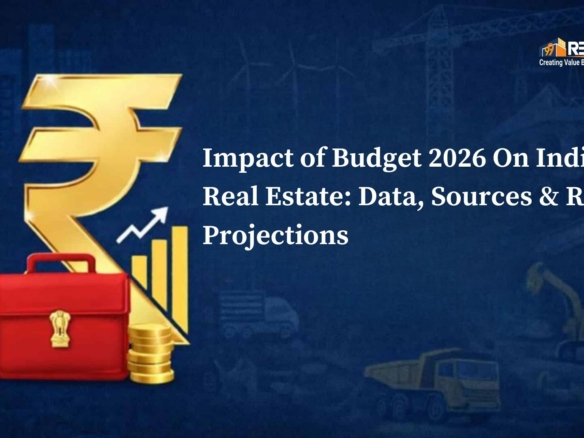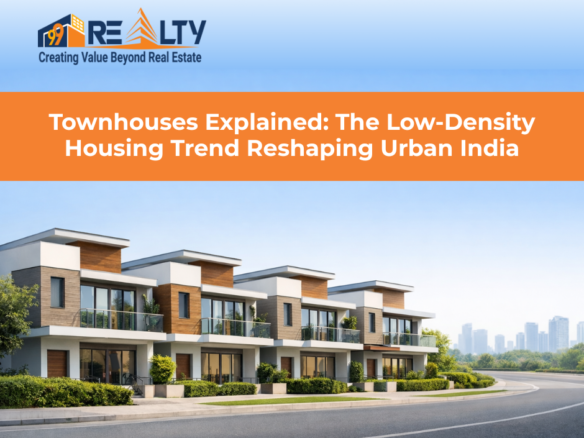Despite years of saving, owning a home in urban India remains a distant dream. Explore why real estate is outpacing income, and how smart investments in emerging cities can still offer high returns in 2025.
The dream of homeownership in India is becoming increasingly elusive. Recent analyses reveal that the Price to Income (P2I) ratio in urban centers averages around 11, indicating that an individual would need approximately 11 years of their full income to afford a home. Considering that a significant portion of income is allocated to daily expenses, this translates to over two decades of diligent savings.
A Deep Dive into India’s Real Estate Crisis
For many urban Indians, especially in metros like Mumbai, Delhi, and Bangalore, homeownership is no longer a milestone—it’s a mirage. Even after two decades of disciplined savings, high-income professionals are still unable to buy a decent property in prime locations. According to investment bankers and market experts, this crisis stems from skyrocketing property rates, slow wage growth, and the overwhelming influence of black money in land dealings.
Union Budget 2025: Pioneering Reforms to Enhance Homeownership Accessibility
The Numbers Speak Louder Than Dreams
- As per industry estimates, the average property price in Mumbai is ₹2.5 crore for a mid-sized flat in a good locality.
- To afford a 20% down payment (₹50 lakh), a household would need to save ₹20,000/month consistently for over 20 years—assuming no other financial burdens or inflation.
- On the other hand, the average salary growth in urban India is just 6-8% per annum, while real estate appreciates by 10-14% annually in Tier 1 cities.
Factors Contributing to Housing Unaffordability
- Restrictive Floor Space Index (FSI): Indian metros have an FSI ranging between 1.3 to 3.5, limiting building heights and necessitating more land to accommodate the growing population. In contrast, cities like New York boast an FSI of 15, and Singapore reaches up to 25, allowing for more vertical expansion.
- Artificial Scarcity by Developers: Some developers release properties in limited phases to create an illusion of high demand, subsequently inflating prices. This practice manipulates market dynamics, making properties less accessible to genuine buyers.
- Investment-Driven Demand: A substantial portion of real estate transactions is influenced by investors seeking to park funds, often leading to inflated property values and sidelining end-users.
The Great Indian Homeownership Debate: Is Buying Still Worth It in 2025?
Renting vs. Buying: Which Is Wiser in 2025?
In a city like Bangalore or Gurgaon, monthly rent for a 2BHK ranges between ₹25,000–₹50,000. A home loan EMI for the same unit can easily exceed ₹80,000/month for 20 years.
Financially, renting can be a smarter move in high-cost zones. It offers flexibility, lower upfront costs, and frees up capital for other investments—like real estate in emerging Tier 2 and Tier 3 cities.
The Rising Dominance of Tier 2 and Tier 3 Cities in India’s Real Estate Market
Strategic Recommendations for Prospective Buyers
Financial Preparedness: Aim to make a down payment covering at least 50% of the property’s value. Ensure that Equated Monthly Installments (EMIs) do not exceed 35% of your net monthly income to maintain financial stability.
Consider Renting: In scenarios where purchasing is financially straining, renting remains a viable alternative, offering flexibility and reduced financial burden.
Explore Tier 2 Cities: Emerging cities present more affordable housing options without compromising on essential amenities, making them attractive alternatives to metropolitan areas.
Stay Informed on Market Trends: With home prices projected to rise by 6.5% in 2025, staying updated on market dynamics is essential. Understanding these trends can help you time your investment strategically.
Work With Trusted Agencies: At 99Realty.in, we handpick growth-ready locations and offer complete transparency for first-time buyers.
Final Verdict: Homeownership Requires Vision, Not Just Savings
Owning a home in India today isn’t about how long you save—it’s about how strategically you plan. The property market, especially in metro cities, has evolved into a highly dynamic and competitive space where affordability no longer aligns with income growth. Instead of chasing homes in overpriced markets, individuals should embrace a flexible approach—investing smartly in emerging cities, renting where necessary, and treating real estate as a calculated asset rather than an emotional milestone.
In this new era, homeownership is no longer a straightforward milestone achieved by default—it’s a goal that requires clarity, timing, and well-informed decision-making. With the right guidance, financial planning, and market research, it is still possible to own valuable property without overextending your finances. Companies like 99Realty are here to support this journey, helping buyers identify affordable and appreciating opportunities that align with their long-term aspirations.
Subscribe to get updates on our latest posts and market trends.






Join The Discussion